|
|
|
Sort Order |
|
|
|
Items / Page
|
|
|
|
|
|
|
| Srl | Item |
| 1 |
ID:
165772
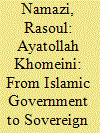

|
|
|
|
|
| Summary/Abstract |
This paper argues that the mature form of the political doctrine of the Ayatollah Khomeini (1902–89), Iranian Shiite religious authority and architect of the Islamic Republic of Iran, grew out of an encounter with the modern understanding of the state and the concept of sovereignty. Khomeini’s political doctrine, called the Absolute Guardianship of the Islamic Jurist, although based on a religious foundation, should be studied as a break with the traditional understanding of political power in Shiism. It will be argued that such a political doctrine can play the same role as the Christian rhetoric of the early modern political thinkers played, pave the way for modernization of Shiite political thought, and prepare the ground for a modern temporal conception of politics.
|
|
|
|
|
|
|
|
|
|
|
|
|
|
|
|
| 2 |
ID:
128313
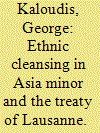

|
|
|
|
|
| Publication |
2014.
|
| Summary/Abstract |
George Kaloudis, discusses events in Greece and Turkey that led to a Christian Holy War against infidels in 1921, and how the Treaty of Lausanne, brokered by European states, reinforced the ethnic genocide that followed in its wake. The Treaty of Lausanne was rooted in the prevailing ideal of the "nation-state," in which each state would consist of a homogeneous ethnic nationality. This concept is, at its core, a concept of structural violence, because there is no such thing as a modern state in which all residents hold identical ethnic and cultural views. Yet, this concept still inspires elites to seek for the elusive ideal in which all citizens will identify with and agree with the policies of the state because they reinforce a particular national ethnic or religious culture.
|
|
|
|
|
|
|
|
|
|
|
|
|
|
|
|
| 3 |
ID:
126661
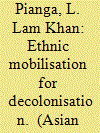

|
|
|
|
|
| Publication |
2013.
|
| Summary/Abstract |
This article attempts to communicate the methodological tension between subjectivity and objectivity by recording the aspiration of communities who are problematised both by colonialism and the modern nation-state. It highlights how colonial policy and practice contribute to the postcolonial imbroglio in Northeast India. It delineates how British colonial cartography always gave priority to 'administrative convenience' in the demarcation of boundaries, resulting in the division of ethnic community. It argues that Northeast India and the Indo-Burma borderland are not yet decolonised, as the government of India, without any rearrangement or alteration, adopts the colonial administrative boundaries, which divided ethnic communities. Neither the State Reorganisation Act (1956) nor the North-Eastern Areas (Reorganisation) Act (1971) fulfilled the aspiration of the segmented communities in the northeast, as they did in the mainland. The article also argues that the responses of the government of India towards the problems in Northeast India react to the manifested symptoms of the deep-rooted political problem rather than getting to the crux of the problem to find a solution.
|
|
|
|
|
|
|
|
|
|
|
|
|
|
|
|
| 4 |
ID:
095993
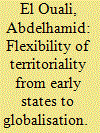

|
|
|
| 5 |
ID:
153020
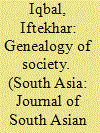

|
|
|
|
|
| Summary/Abstract |
This paper explores the anxious and sometimes hostile relationship between modern forms of civil society and non-modern institutions in Bangladesh. I argue that an uneasy relationship arises from civil society's inability or lack of initiative to identify and negotiate with ‘pre-modern’ social institutions and their remnants, which I conceptualise here as samaj. Such dissonance and disengagement have been historically constructed largely with regard to the way in which the roles of the state, capital and market forces have been conceptualised at the interface between ‘modernity’ and ‘tradition’. This proposition demands a genealogical understanding of the relationship between civil society and samaj, in which the latter is represented by religious institutions such as the khanqah and the madrasa.
|
|
|
|
|
|
|
|
|
|
|
|
|
|
|
|
| 6 |
ID:
140660
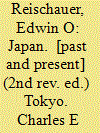

|
|
|
|
|
| Edition |
2nd rev. ed.
|
| Publication |
Tokyo, Charles E Tuttle Company, 1954.
|
| Description |
xi + xi, 292p.pbk
|
|
|
|
|
|
|
|
|
|
|
|
Copies: C:1/I:0,R:0,Q:0
Circulation
| Accession# | Call# | Current Location | Status | Policy | Location |
| 012065 | 952/REI 012065 | Main | On Shelf | General | |
|
|
|
|
| 7 |
ID:
073278
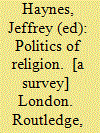

|
|
|
|
|
| Publication |
London, Routledge, 2006.
|
| Description |
xi, 283p.
|
| Standard Number |
1857433483
|
|
|
|
|
|
|
|
|
|
|
|
Copies: C:1/I:0,R:1,Q:0
Circulation
| Accession# | Call# | Current Location | Status | Policy | Location |
| 051550 | 322.1/HAY 051550 | Main | On Shelf | Reference books | |
|
|
|
|
| 8 |
ID:
108480
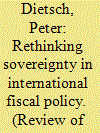

|
|
|
|
|
| Publication |
2011.
|
| Summary/Abstract |
The power to raise taxes is a sine qua non for the functioning of the modern state. Governments frequently defend the independence of their fiscal policy as a matter of sovereignty. This article challenges this defence by demonstrating that it relies on an antiquated conception of sovereignty. Instead of the Westphalian sovereignty centred on non-intervention that has long dominated relations between states, today's fiscal interdependence calls for a conception of sovereignty that assigns duties as well as rights to states. While such a circumscribed conception of sovereignty has emerged in other areas of international law in recent years, it has yet to be extended to fiscal questions. Here, these duties arguably include obligations of transparency, of respect for the fiscal choices of other countries, and of distributive justice. The resulting conception of sovereignty is one that emphasises its instrumental as well as its conditional character. Neither state sovereignty nor self-determination is an end in itself, but a means to promoting individual well-being. It is conditional in the sense that if states do not live up to their fiscal obligations towards other states, their claims to autonomy are void.
|
|
|
|
|
|
|
|
|
|
|
|
|
|
|
|
| 9 |
ID:
113408
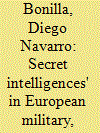

|
|
|
|
|
| Publication |
2012.
|
| Summary/Abstract |
A representative sampling of 53 treatises onRe militari, diplomacy and theory of state that were published in Europe is analyzed in order to outline the role of secret intelligence in the direction of armies and the government during the sixteenth and seventeenth centuries. The participation of spies, confidants and informers in the exercise of power, whether political, military or economic is a timeless constant, which is not at all anecdotal or marginal. We offer conclusions regarding the formalization of modern intelligence systems based on concepts as closely related as secrets, advice and deception, which configure the precursors of the systematic theory of contemporary intelligence.
|
|
|
|
|
|
|
|
|
|
|
|
|
|
|
|
| 10 |
ID:
108438


|
|
|
|
|
|
|
|